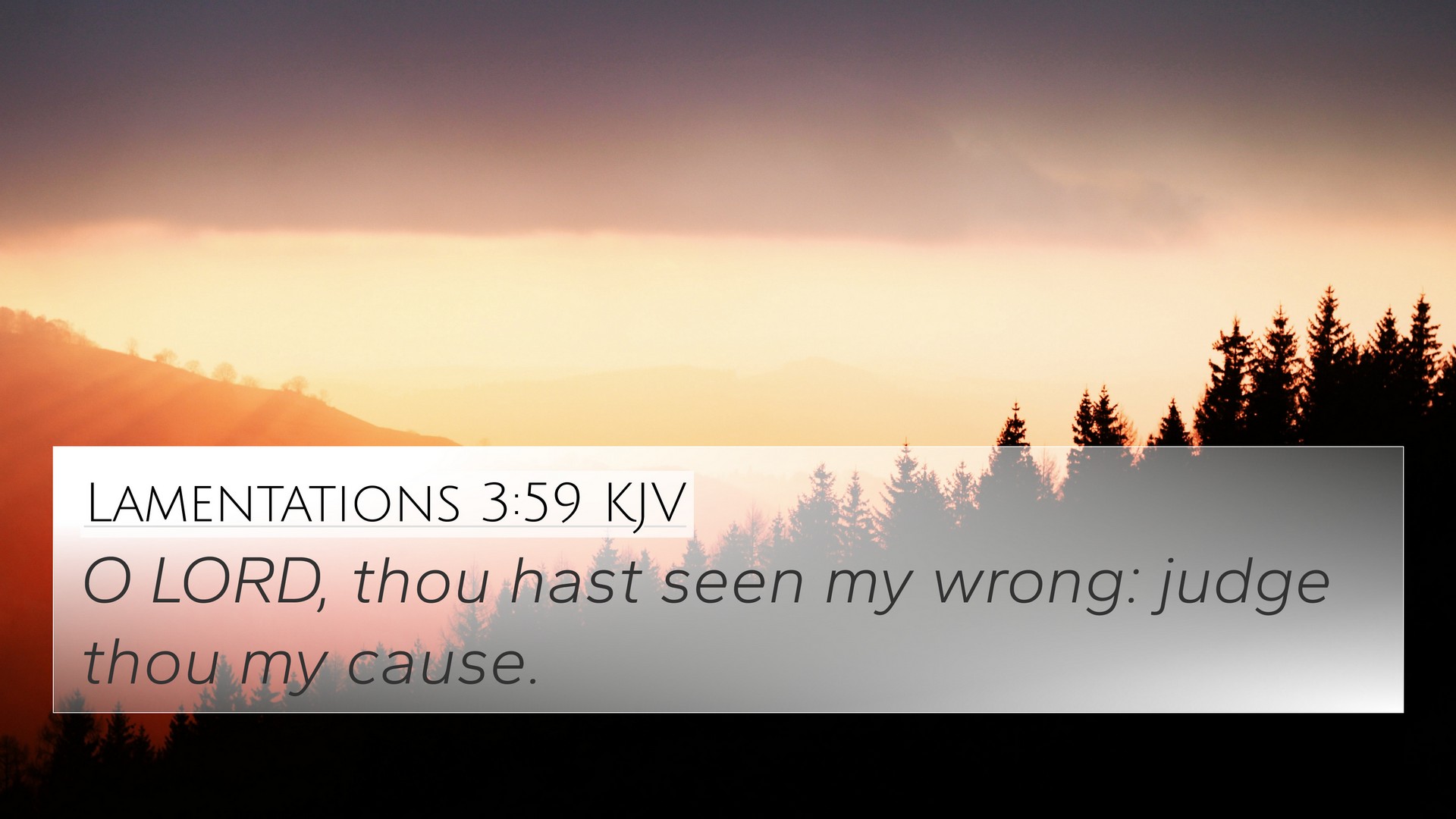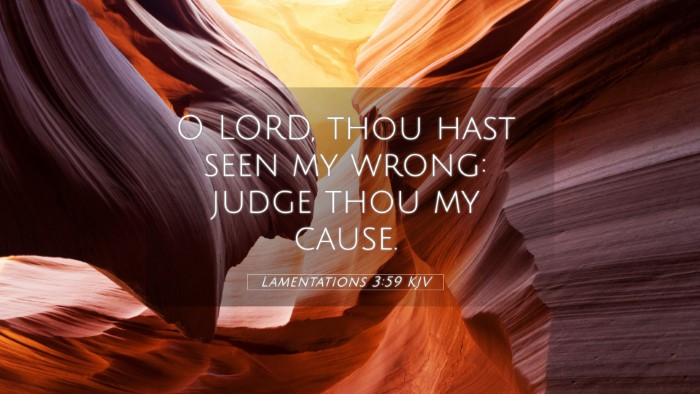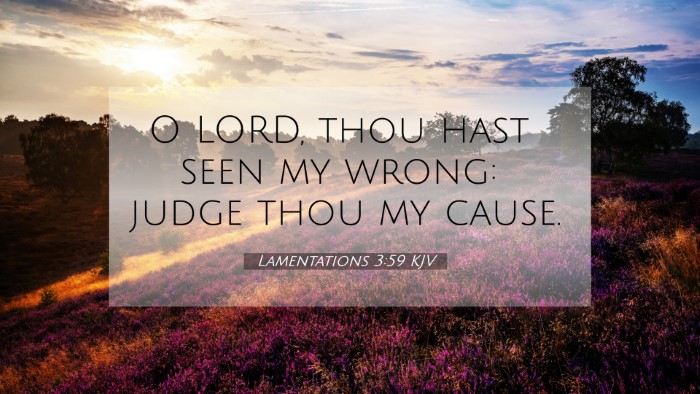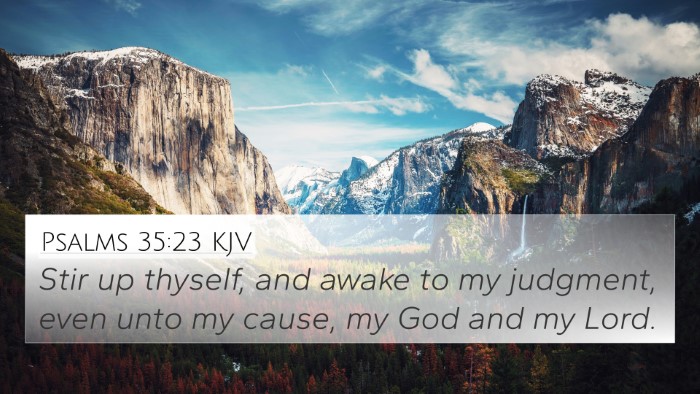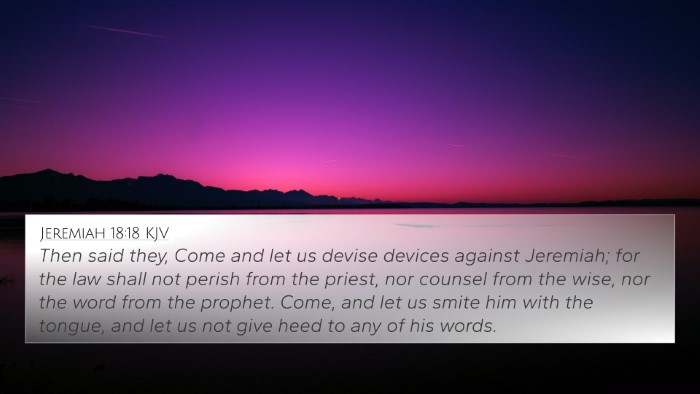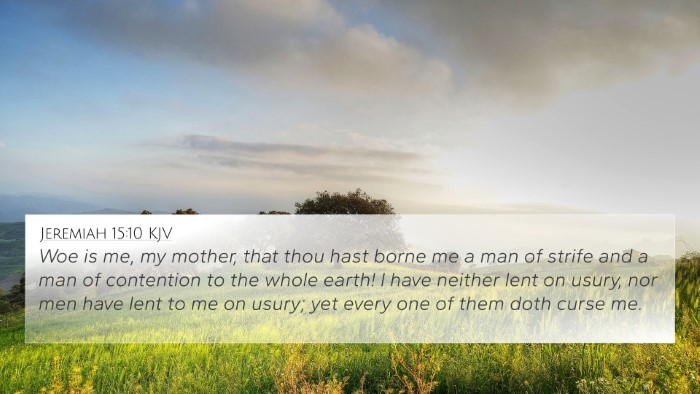Understanding Lamentations 3:59
Lamentations 3:59 states, "O Lord, thou hast seen my wrong; judge thou my cause." This verse is a plea for divine justice, expressing the heart of the lamenting prophet amidst suffering and distress.
Interpretation and Significance
This verse encapsulates the essence of human suffering and a call for God’s attention to personal grievances. It reflects a profound moment of self-reflection and yearning for righteousness. Here, the prophet expresses a confidence that the Lord observes injustices, serving as a reminder that God is an attentive judge who will address the wrongs done to His people.
Insights from Public Domain Commentaries
-
Matthew Henry:
Henry emphasizes the importance of God’s oversight in human affairs. He notes that the statement encapsulates a believer's assurance that God is not oblivious to their suffering and has the power to right the wrongs done to them. The verse highlights the significance of bringing one’s cares and injustices to God, who is the ultimate judge.
-
Albert Barnes:
Barnes reflects on the emotional weight of the verse, suggesting that the prophet seeks validation for his pain and acknowledges God's power in administering justice. His commentary reveals how the plea for divine judgment is rooted in the belief that God is just and will act in accordance with His nature to rectify wrongs.
-
Adam Clarke:
Clarke discusses the context of this lamentation, noting it as a significant expression of both despair and hope. He points out that the prophet’s cry is one of desperation, yet it simultaneously signifies faith in God’s justice. Clarke emphasizes that authentic prayer acknowledges one’s plight before God while seeking His righteous intervention.
Bible Verse Cross-References
This verse connects to several other scriptures that highlight themes of injustice, divine justice, and the faithful's call for God's intervention:
- Psalms 7:9: “O let the wickedness of the wicked come to an end; but establish the just: for the righteous God trieth the hearts and reins.”
- Psalms 26:1: “Judge me, O Lord; for I have walked in mine integrity: I have trusted also in the Lord; therefore I shall not slide.”
- Isaiah 30:18: “And therefore will the Lord wait, that he may be gracious unto you, and therefore will he be exalted, that he may have mercy upon you: for the Lord is a God of judgment: blessed are all they that wait for him.”
- Micah 6:8: “He hath shewed thee, O man, what is good; and what doth the Lord require of thee, but to do justly, and to love mercy, and to walk humbly with thy God?”
- Jeremiah 11:20: “But, O Lord of hosts, that judgest righteously, that triest the reins and the heart, let me see thy vengeance on them: for unto thee have I revealed my cause.”
- Romans 12:19: “Dearly beloved, avenge not yourselves, but rather give place unto wrath: for it is written, Vengeance is mine; I will repay, saith the Lord.”
- Revelation 19:2: “For true and righteous are his judgments; for he hath judged the great whore, which did corrupt the earth with her fornication, and hath avenged the blood of his servants at her hand.”
Thematic Connections and Cross-Referencing
Lamentations 3:59 is part of a broader narrative in scripture that deals with the themes of suffering, injustice, and divine retribution. Each scripture mentioned creates a tapestry of inter-Biblical dialogue that underscores the necessity of bringing grievances before God and trusting in His judgment.
- Comparison with Psalms: The Psalms frequently materialize as heartfelt cries for justice, paralleling the sentiment expressed in Lamentations. The structure of lament in the Psalms offers insights into the emotional depth and theology of crying out to God in times of need.
- Link to Prophetic Literature: The prophetic writings often emphasize God's role as a just judge. Lamentations aligns with the themes in the Major and Minor Prophets concerning the consequences of the people's sin and God's commitment to justice.
- Connection to New Testament Teachings: The New Testament writers reinforce the belief in God's ultimate justice, as seen in the teachings of Jesus and the apostolic letters. The call for divine judgment resonates with the New Testament’s emphasis on injustice being recognized and addressed in God's kingdom.
Tools for Bible Cross-Referencing
To explore these connections further, individuals studying Lamentations 3:59 can utilize various tools:
- Bible Concordance: A good concordance allows readers to find words and themes that connect scriptures across the Bible.
- Bible Cross-Reference Guide: These guides provide structured links to similar verses, making it easier to study cross-referenced themes.
- Cross-Reference Bible Study: Engaging in a Bible study focusing specifically on cross-references can deepen understanding of connected verses.
Conclusion
Lamentations 3:59 serves as a poignant reminder of the faithfulness of God amidst trials. The prophet’s yearning for justice encapsulates the human experience of suffering while showing dependence on God’s righteous nature. By utilizing the cross-references and insights provided in various commentaries, believers can enrich their understanding of this powerful verse and its implications for their lives. Through the practice of thematic Bible verse connections and comparative analysis, one uncovers the beauty of scripture's cohesive message regarding justice, faith, and divine intervention.
